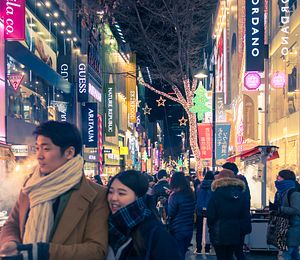In most of the developed world, a business that denies service on the basis of a person’s race or nationality runs the risk of landing in court. Not so in South Korea, where it remains both legal and relatively uncontroversial for establishments such as bars, nightclubs and saunas to deny entry to people who don’t look Korean.
Like neighboring Japan, but unusually for a wealthy democracy, South Korea lacks any legal prohibitions on racial discrimination by private businesses.
The Korea Herald, an English-language newspaper, recently reported on a raft of bars and clubs with a “no foreigners” policy. One establishment, Green Light, located in a popular student area, was reported to have posted a sign outside reading, “Only Koreans are allowed because our employees cannot communicate in English.”
The article sparked outrage among foreign residents, but also quoted several Koreans who saw no problem with such a policy.
“I know that a few clubs in Hongdae refuse to accept foreigners, especially American soldiers, based on their past experiences. They have suffered from the U.S. soldiers getting into brawls and creating a ruckus,” Kim Jung-hyun, the head of the Hongdae Tourism and Culture Association, told the paper. “But it is not a matter of racism. It is up to business owners to determine who to let in.”
Accounts of establishments that bar foreigners are common on social media and in the country’s English-language media, despite attracting little coverage in the vernacular press.
In just over a year since last January, at least seven drinking establishments — Green Light, AU, Club Fix, Lounge & Club Move, 24/7 Lounge, Fiesta, and Itaewon Pojangmacha — and one sauna — Bally Aqua Land — have been documented barring foreigners.
(Full disclosure: this author has been denied entry to several of the businesses mentioned above.)
In 2014, Mutuma Ruteere, the UN special rapporteur on racism, called on South Korea to introduce anti-discrimination legislation in a presentation outlining the country’s “serious problems” with racism. Since 2007, several wide-reaching anti-discrimination bills have failed to get through parliament, largely due to Christian opposition to the inclusion of sexual minorities in the legislation.
Ben Wagner, an attorney who brought the first successful case against the country under the International Convention on the Elimination of All Forms of Racial Discrimination over its HIV-testing policy for foreigners, told The Diplomat that South Korea was obliged to take legal measures against discrimination.
“A breach of Korea’s UN treaty obligations to eliminate racial discrimination is very clear in condoning such practices,” he said.
While historically homogeneous, South Korea has seen its number of foreign residents triple in the last decade due mostly to an influx of low-skilled migrant workers and marriage migrants. While still small by international standards, the “foreign” population reached 3.4 percent last year, according to government figures, the majority of which was Chinese. Despite the terminology used in the data, the government’s definition of foreigners also includes naturalized citizens and their children.

































